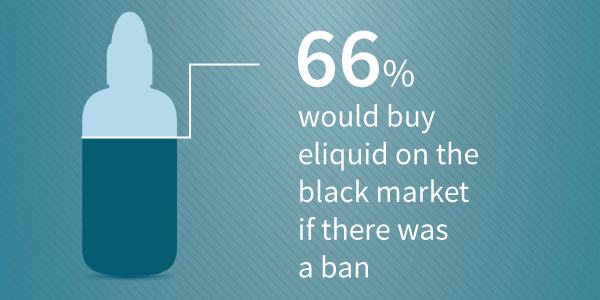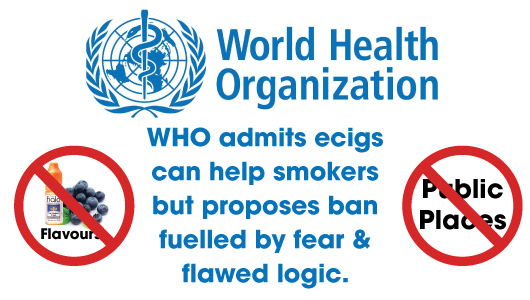
Phew! Yesterday I was called in from a day off to do an interview with Radio Wales with an hour's notice.
The subject? The WHO's latest statements on ecigarettes (that's a lot to digest in an hour!)
With little time to prepare, I was so nervous in the interview that I was shaking throughout. (If you are interested, you can listen here - it starts about 9 minutes in.) Fortunately, I've now had more time to digest the report.
And while most coverage has focused on negative aspects, Dr Farsalinos has pointed out that the release is more moderate than previous positions.
(You can read Farsalinos' excellent post on the release here, as well as Clive Bates' response here.)
In particular:
i. The WHO acknowledges ecigs can help smokers who have been failed by other methods. ii. They acknowledge that there is no evidence that ecigs are normalising smoking, and that evidence in the UK suggests the opposite is happening.
That said, there's a lot wrong with the WHO release, with the biggest being a recommendation that flavours are banned.
So here's a quick roundup of the WHO attitude towards ecigs. I'd love to know what you think, so please let me know in the comments!1. WHO Thinks You Hate Non-Tobacco Flavours
If you believe the WHO, no adult vapers are interested in vaping non-tobacco flavours.Instead, alternatives to tobacco flavours are apparently designed to hook young kids. But:
i. UK Data Shows Children Are Not Using Ecigs
Yet according to current data in the UK (produced by Action on Smoking and Health UK), young people who don't smoke are not using ecigs on a regular basis (once a month or more). (For more information see: Are Ecigs a Gateway to Smoking: The Evidence.)
So it's clear that flavours are not hooking children. So why are companies producing them, and who is buying flavours?
Fortunately, an ECF survey provides the answer.
ii. Survey of 10,000 Vapers Shows Non-Tobacco Flavours Most Important
A survey of 10,000 adult vapers by ECigaretteForum shows that fruit flavours are the most popular eliquid flavour.
It's obviously absolutely ridiculous to say that adults don't like non-tobacco flavours, but unfortunately we have to prove it :(
Non-tobacco flavours are also very important in helping ex-smokers stay off tobacco cigarettes, for if you have switched to a non-tobacco non-menthol ecigarette, you're far less likely to go back to smoking tobacco cigarettes.
iii. Black Market Threat
There's another danger to banning eliquid flavours.
Over 60% of users have said they would buy eliquid on the black market.
Now ECigaretteDirect's manufacturing process involves:
- in-house testing by a qualified pharmacologist
- external testing by a UK government approved lab
- additional testing and auditing by ECITA
- sourcing UK pharmaceutical grade nicotine, guaranteed to be 99.9% pure
- reviewing all ingredients to make sure they are safe and are not known lung irritants
2. Ecigs Only Slightly Better Than NRT Aids
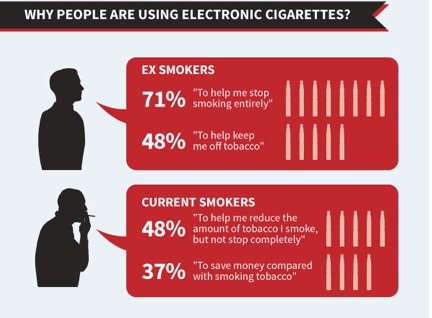
The WHO relucantly admits that ecigs can help some smokers, although it argues there is little evidence that they are much better than NRT aids.
That's based on a study much criticised by scientists. The study used naive vapers and an ineffective brand of ecigs.
Meanwhile, real life studies show that 2.1 million people now use ecigs in the UK.
Of this, one third have stopped using ecigs completely. So that's 700,000 who have stopped using ecigs - an awful lot more than have stopped with help from the NHS.
What I find interesting is that we have no data on people who have stopped using both ecigs and cigarettes - if we did, the number who have stopped smoking with ecigs might be a lot higher than 700,000.
Research has also shown that dual use of NRT aids and cigarettes eventually lead to complete cessation, so many dual users may end up stopping altogether in the future (Source: NICE).3. Risk of Nicotine Poisoning
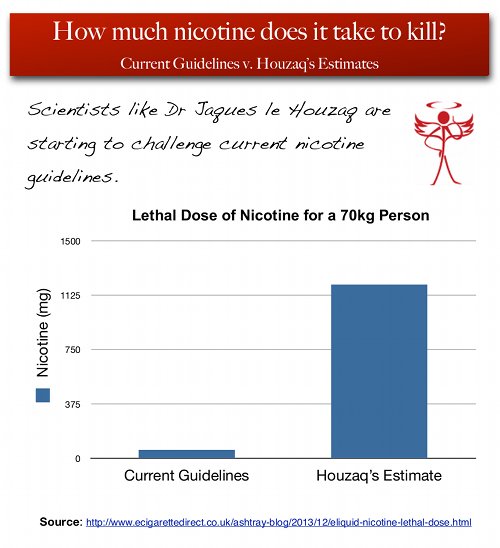
While highlighting the danger of nicotine poisoning, the WHO admits that information and data is scarce.
Fortunately, there have actually been studies conducted on the risk of nicotine poisoning, which have found:
1. Risk is low compared to household products (Source: NCBI) 2. Eliquid is at a comparable or lower risk level than washing up liquid (see EU Made Massive Mistake With Eliquid Safety.)
It's also worth noting that recent research has found that nicotine is far less dangerous than previously thought (see How Much Eliquid It Takes To Kill).
Of course, it's still worth taking precautions, and measures like childproof bottles (already mandated by ECITA) are a no-brainer.4. Risks of Nicotine and Toxins
[caption id="" align="aligncenter" width="600"]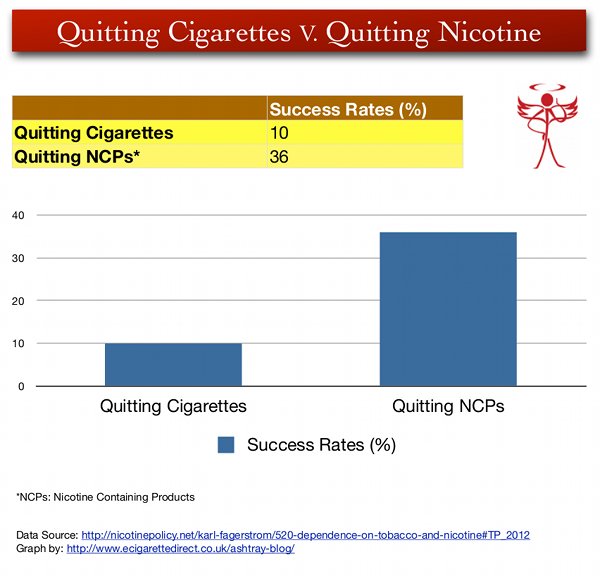 Data shows that it is easier to quit pure nicotine than it is to quit cigarettes.[/caption]
Data shows that it is easier to quit pure nicotine than it is to quit cigarettes.[/caption]The WHO also highlights the danger of nicotine, arguing that it could accelerate the growth of cancer.
While studies show that nicotine itself is not the cause of cancer, there is mixed evidence as to whether it accelerates the growth of cancer. (See Nicotine in Ecigs: 10 Facts All Users Should Know.)
The WHO also ignored research that suggests nicotine when seperated from tobacco may be less addictive (see Why everything they told you about nicotine addiction could be wrong).
In addition, the WHO has pointed out that nicotine is bad for pregnant woman.
That's completely correct - nicotine is bad for unborn babies. What I'd like to see is the WHO addressing the question of whether pregnant women who can't quit nicotine 100% (which is obviously the best option) would be better off using tobacco cigarettes, with their tar, smoke and carcinogens or smokeless alternatives to cigarettes.
It also argues that there is a danger that toxins in electronic cigarette vapour could be harmful to the people, arguing that even small increases above background levels could be harmful. This completely ignores research that shows that toxins found in vapour are within accepted published levels.5. The Normalisation Argument
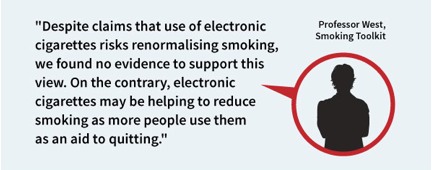
The WHO worries that ecigs normalise smoking, despite acknowledging that:
1. There is no evidence that ecigs are renormalising ecigs. (As it points out, 99% of ecig users are previous smokers.) 2. That in the UK a boom in ecigs has coincided with a fall in the use of tobacco cigarettes.
I'd argue that with at least 2,1 million Brits smoking less or not at all because of vaping, and a decrease of 9% in cigarette duty in 2013 alone, ecigs denormalise smoking. And our survey of 1600 users show that restrictions will lead to a massive return of vapers to smoking.
What's more, the WHO is calling for a restriction (but not a ban) on advertising despite acknowledging that there is no evidence that there have been negative effects from advertising. Some of it's proposals are sensible (for example, making it clear that ecigs are for smokers, not for non-smokers) while others are less so (forbidding the use of the word e-cigarette when marketing ecigarettes!)6. Banning Ecigs in Public Places
…the risks to others of electronic cigarette vapour are extremely low. I would rather that someone was using an electronic cigarette than smoking a cigarette, and if use indoors is important to help them stay off smoking, then why not?Professor John Britton of the Royal College of Physicians speaking on the BBC
Claiming that e-cigarettes are dangerous for non-smokers is about as credible as claiming that air travel is dangerous for people who never set foot in an airplane.Professor Brad Rodu
As we've seen, there is no evidence that ecigs are a gateway to smoking. Studies like this and these show that they are also not a health risk non-smokers.
Yet the WHO proposes forcing vapers outside with other smokers, where the chances of them going back to tobacco cigarettes will sky rocket.
Obviously there are some places where vaping might not be appropriate (family pubs and playgrounds spring to mind!) Let's make sensible decisions on a case by case basis rather than banning ecigs everywhere!7. Ban Ecigs From Lobbying For Ecigs: Allow Pharmaceutical Companies To Lobby Against Them
[caption id="attachment_11458" align="aligncenter" width="300"] This paid pharmaceutical ad tells smokers not to vape. Yet research shows that ecigs are more effective than NRT at getting people off ecigs.[/caption]
This paid pharmaceutical ad tells smokers not to vape. Yet research shows that ecigs are more effective than NRT at getting people off ecigs.[/caption]The WHO argues that ecigarette companies should not be allowed to advocate for or against ecig regulation or legislation.
However, we know that the pharmaceutical industry, which sells competing nicotine products, has been advocating heavily against ecigs, both directly and through charities which it funds. (As ex-ASH director Clive Bates points out, big pharma is even taking out paid adverts against vaping.)
To restrict ecig companies without restricting pharmaceutical companies (and funded charities) seems patently unfair.
Also see: Guess WHO? Vaping, harm reduction and the WHO
What do you think? In particular, how would a ban on flavours effect you? Let me know in the comments!
If you found this blog post useful, I'd really appreciate if you'd take a second to share it using one of the share buttons below :)


